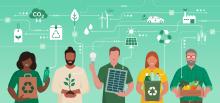Humans love to eat meat. From 50 million metric tons in 1950, annual meat production has jumped over five times to 275 million metric tons in 2015. That translates to the slaughter annually of some 300 million cattle, 1.5 billion pigs, and a staggering 50 billion chickens. The discarded chicken bones, scientists says, will form a fossil layer under the Earth’s surface that will mark the Anthropocene – the geological age dominated by human activity.
Much of that can be attributed to the rapid urbanisation of the 20th century, explains Sir Nigel Thrift.
- Read more about Eating the world
- 329 views





